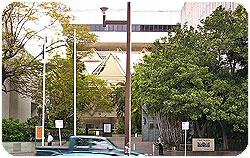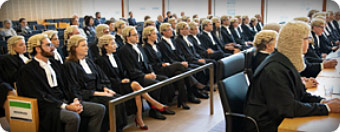 On 1 October 2007, the Queensland Public Interest Law Clearing House (QPILCH) commenced the Self-Representation Civil Law Service (SRCLS). The SRCLS is funded by the Department of Justice and has the support of The Honourable Paul de Jersey AC, Chief Justice of Queensland and Patron of QPILCH, and Her Honour Chief Judge Patsy Wolfe.
On 1 October 2007, the Queensland Public Interest Law Clearing House (QPILCH) commenced the Self-Representation Civil Law Service (SRCLS). The SRCLS is funded by the Department of Justice and has the support of The Honourable Paul de Jersey AC, Chief Justice of Queensland and Patron of QPILCH, and Her Honour Chief Judge Patsy Wolfe.
The SRCLS assists eligible litigants in person (LIPs) with the conduct of their case in the civil trial jurisdictions of the Supreme and District Courts. Through the provision of legal advice and information on court procedure, the SRCLS aims to assist LIPs to exercise their legal rights, while discouraging unnecessary litigation.
 The SRCLS will operate from the Brisbane Law Courts Complex from November 2007 and will work in cooperation with a new information kiosk at the Supreme and District Courts Registry and a court support service. Discrete legal services will be provided directly to LIPs by a QPILCH solicitor and by volunteer solicitors from QPILCH member law firms.
The SRCLS will operate from the Brisbane Law Courts Complex from November 2007 and will work in cooperation with a new information kiosk at the Supreme and District Courts Registry and a court support service. Discrete legal services will be provided directly to LIPs by a QPILCH solicitor and by volunteer solicitors from QPILCH member law firms.
The SRCLS will receive ongoing advice from a multi-disciplinary LIPs Reference Group, which will oversee the operation, training and evaluation of the SRCLS. The Chair of the Reference Group is retired justice Martin Moynihan AO, and the members will include a barrister, senior litigation solicitor, forensic psychiatrist and social worker.
The need for the SRCLS
For a number of years, the courts have raised concerns over the increasing number of LIPs and their impact on court resources. Although a significant number of LIPs have sought assistance from QPILCH, many of their cases could not be assisted because they lacked legal merit and/or did not raise public interest issues. Even so, the QPILCH management committee has always regarded the lack of representation to be a public interest issue and the greatest gap in civil law service delivery. The SRCLS potentially fills this important gap by providing assistance to disadvantaged people who cannot obtain representation.
The establishment of the SRCLS has been influenced by QPILCH’s extensive research into self-representation in other Australian and overseas jurisdictions, and research with the QUT School of Law into self-representation in the Court of Appeal. Although statistics of LIPs in the Supreme and District Courts are not available, it is understood that the level of self-representation is roughly equivalent in all state courts and that one case in four has at least one self-represented party.
- Research in the UK has revealed the following issues associated with self-representation:
- many people that take legal action to resolve their problems come to regret their handling of it;
- the sooner problems are addressed, the more likely they are resolved;
- the more a client is referred, the less likely they are to ultimately receive help; and
- if a client has one legal problem, they are likely to have another.
Research has also shown there is a need to respond to these and other associated issues in three ways:
- enhance understanding of the legal system (with simpler laws and court procedures);
- enhance access to information and resources (usually through court based information and self-help processes); and
- enhance access to legal advice and representation to assist people incapable of representing themselves, and to support LIPs capable of representing themselves (Australian Law Reform Commission, Supporting Access to Justice for Cases with Merit, Chapter 4, www.ag.gov.au).
In conjunction with other new services for LIPs being provided by the Supreme and District Courts, the SRCLS will focus on the second and third of these objectives by ensuring that LIPs have access to information to both understand and use the legal system. The SRCLS will provide high quality advice and assistance, and where possible, referral for representation. Given the issues associated with self-representation, the SRCLS aims to provide a comprehensive legal service which addresses problems as early as possible.
Operation of the SRCLS
The SRCLS is modelled on the highly successful Citizens Advice Bureau (CAB), which operates from the Royal Courts of Justice (RCJ) in London. Solicitors employed by the RCJ Advice Bureau, and supported by volunteer solicitors from 60 law firms, provide free advice to LIPs and potential LIPs on civil law matters that are dealt with at the RCJ.
The SRCLS may be contacted by LIPs through direct referral, telephone or email. Requests for assistance will initially be assessed by a QPILCH paralegal who will make an appointment for eligible LIPs to meet with a QPILCH or volunteer solicitor. During the appointment, the solicitor will provide legal services to assist the litigant to undertake the necessary steps to continue with their court proceedings. The litigant may also receive ongoing assistance, at each stage of their court proceedings, through correspondence and further appointments. Those LIPs who have a case with strong prospects of success may be referred to QPILCH member law firms and barristers for some form of assistance, including representation.
Legal services provided by the SRCLS
The staff or volunteer solicitor will provide the following discrete legal services to assist LIPs to put their case forward:
- give legal advice;
- draft documents, including pleadings, affidavits, court forms, submissions and correspondence;
- conduct legal research;
- suggest other options for resolution of the case;
- assist with associated problems; and
- refer appropriate cases for further advice, support or representation.
The SRCLS aims to help LIPs:
- understand the law, court process and procedure, legal concepts, the rights and perspective of the other party, and the perspective and requirements of the court;
- observe court rules and proper process;
- be aware of potential orders and the effect of not complying with orders; and
- present arguable points in the best light and in the best possible way.
Eligibility for assistance from the SRCLS
The following LIPs are eligible for assistance from the SRCLS:
- individuals;
- small corporations;
- community organisations;
- plaintiffs and defendants; and
- applicants and respondents.
The SRCLS reserves the right to not provide assistance to LIPs:
- whose case lacks legal merit;
- who do not comply with the orders of the Court or the advice of the SRCLS;
- who can afford representation;
- who raise a conflict of interest;
- who are eligible for legal aid; and
- whose requests are so urgent, the SRCLS cannot effectively assist them in time.
Coming soon — QPILCH’s Court of Appeal Self-Representation Service
In February 2008, QPILCH will commence a self-representation service to assist LIPs in the Court of Appeal. The service will be run with the assistance of volunteer lawyers (including retired practitioners and practising barristers) and a student legal clinic. More information on this service will be provided in the next issue of Hearsay.
Contact the SRCLS
For more information or to contact the SRCLS, please phone Erin Thomas on 3012 9773 or send an email to selfreps@qpilch.org.au.
Erin Thomas*
*Erin Thomas, formerly a solicitor at Deacons, has been appointed the Self-Representation Civil Law Service’s first solicitor.





 The SRCLS will operate from the Brisbane Law Courts Complex from November 2007 and will work in cooperation with a new information kiosk at the Supreme and District Courts Registry and a court support service. Discrete legal services will be provided directly to LIPs by a QPILCH solicitor and by volunteer solicitors from QPILCH member law firms.
The SRCLS will operate from the Brisbane Law Courts Complex from November 2007 and will work in cooperation with a new information kiosk at the Supreme and District Courts Registry and a court support service. Discrete legal services will be provided directly to LIPs by a QPILCH solicitor and by volunteer solicitors from QPILCH member law firms.